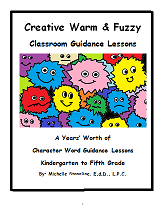Why Should All Mental Health Professionals Understand Neuroscience?
By our writer-in-residence Briana Cowles (Neuroscience Major)
Personally, I believe it is of extreme importance for mental health professionals to have a basis of understanding in neuroscience. You wouldn't go to a doctor with no background in cardiac anatomy if you have cardiovascular disease, why go to a professional with no understanding of neural anatomy to treat something like depression?
Structure is correlated to function, and can have tremendous implications on overall health. So many occurrences impact the actual physical structure of our brains- emotions, thoughts, actions, experiences- all play roles that affect our lives and longevity.
Counselors, psychologists, social workers, are all actively building brain networks when they work with their patients. So while empathic understanding and listening is crucial, understanding how the brain is changing in a young child vs adult is just as important. Neuroscience acts to point out awareness that environment and culture shape individuals and bridges those biological and psychological processes. Neuroscience supports counseling and psychological practices; it also depicts WHY they work. Wellness and environmentally based orientation are crucial, and this can help improve professional's work with their clients and help professional's know what direction is best to take for future help. These mental health professionals and neuroscience actually go hand-in-hand, and, in my opinion, need to work together to better help clients seeking assistance.
There are actually a few concepts that illustrate the benefits of neuroscience to mental health professionals. These include: neuroplasticity, neurogenesis, emotions, and behavior/attention. Neuroplasticity is simple to understand, it basically states that the brain can (and will) change. Even in old age, new connections and neural networks are established, regardless of genetic background, life experiences, or age.
Basically speaking, you really can teach an old dog new tricks. Neurogenesis is the growth and development of nervous tissue- and counseling supports this! New neurons can actually be generated in learning processes, even well into old age.
Neurogenesis is found in multiple areas, and new neural networks are developed throughout the lifespan in response to new stimuli in the environment. A working example is exercise- there's an increase in blood flow and an increase in the release of serotonin. This serotonin is associated with with increases in positivity; it's particularly beneficial to clients struggling with depression- they not only feel better, but their brains actually expand.
Brain imaging reveals that our emotions affect different areas of the brain. The amygdala is the component responsible for negative emotion, but it is also responsible for engaging learning and absorbing new inputs and memories. The hippocampus and prefrontal cortex are activated by positive emotions, and the nucleus accumbens (a region in the basal forebrain) sends signals to the posterior cingulate cortex (an area around the midline of the brain) and prefrontal cortex, allowing an individual to actually focus on the positive.
Positive thinking and feeling are greatly influenced by executive cognitive functions. Behavior and attention are required for learning, such as the counseling process. Today, our understanding of behavior and attention is measurable through brain imaging techniques.
We know that attention requires multiple factors, such as arousal and focus- we also know that arousal involves the reticular activating system (present at the brain's core), which then transmits stimuli to the cortex and activates neurons. The brain is holistic, but the frontal cortex is more than capable of determining the direction of attention. As a professional, this means attend your clients with energy and interest, and what you communicate will end up being more effective.
We tend to think of things like empathy as abstract, but it's not, it's identifiable and measurable in the brain. It is, in actuality, an intentional capacity. Neuroscience has uncovered certain neurons, (rightly named mirror neurons), that send signals when we behave, think, or feel; they also send signals when others around us behave, think, or feel.
These mirror neurons enable individuals to sense and understand what your friend, family member, coworker, or client is feeling. These neurons actually directly impact the internal bodily responses when an individual is empathically experiencing the world of someone they are conversing with. As a mental health professional, it is their duty to awaken these mirror neurons in the client and facilitate their development of new connections in feelings, thoughts, and actions.
This process can be witnessed in the verbal behavior of clients, as well as the actions they begin taking. Clients work to restore their underlying issues, and new neural connections are actively developed.
Why Should Mental Health Professionals Look at the Brain?
Neuroscience Writer in Residence Briana Cowles
Disclaimer: This website and its content is intended for trained licensed mental health professionals and school certified mental health professionals to use for their clients / students at their own discretion.
*If you ignore the disclaimer above are using these techniques on yourself and you feel any discomfort or upset it is highly suggested that you seek out a licensed mental health professional immediately.
"Beyond Art Therapy" is the concept from Dr. Stangline that combines all creative fields in therapy. It is not the traditional "art therapy" but goes beyond to include sand tray therapy, play therapy, mindfulness, meditation, color therapy, cognitive behavioral therapy, and a vast majority of other therapies.
For any other type of mental health emergency call your local 911 / Police Number immediately.
Dr. Stangline does not offer advice / suggestions to anyone who is not a professional mental health provider, or a student who is studying this field and has questions about mental health programs of study.
See our Exciting Selection of eBooks:
Award Winning:
Creative Counseling 101 eBook
Our Best Seller!
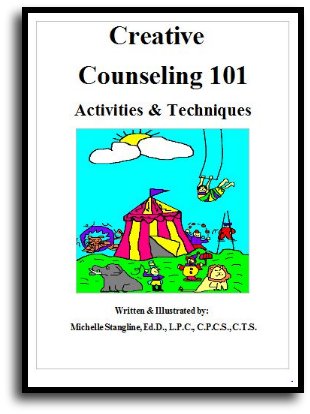
Step By Step Therapy:
Learn how to be a more Creative Therapist with the Book that started it all!
- Graduate School Counseling book used by hundreds of graduate counseling students!
- Includes full color reproducible worksheets with most activities.
- Winner of the Counselor Writer of the Year Award, 2011, Georgia Regional Award
Download Your Copy Today Only $39.95:
See Creative Counseling 101 eBook Information Here:
Get the Set
of all four
eBooks for only $98.95:
An incredible collection of how to do therapy eBooks!
A $159.80 Value,
You Save Over $60!
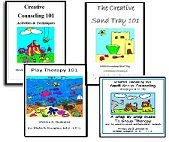
Get your complete set of the Creative Counseling 101.com eBooks by Dr. Michelle Stangline for only $98.95, that's less than $25.00 per eBook (Regular Price is $39.95 for each eBook.).
Your complete set includes:
- Creative Counseling 101
- Creative Group Counseling 101
- Creative Play Therapy 101
- Creative Sand Tray 101
For more information click the link below:
See Complete Set of eBooks For Sale Here:
New!!! "Beyond Art Therapy" 101 eBook
Over 300 pages of Beyond Art Therapy activities and techniques. Learn what I teach graduate counseling students!
See the link below for more information.
Only $39.95
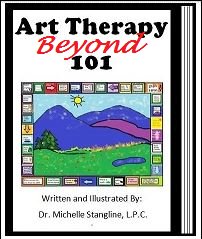
See More Invividual eBooks For Sale:
Sand Tray Therapy 101 eBook:
Learn how to do Sand Tray Therapy or enhance your skills.
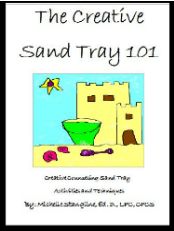
Play Therapy 101 eBook
Learn how to do play therapy or enhance your skills.
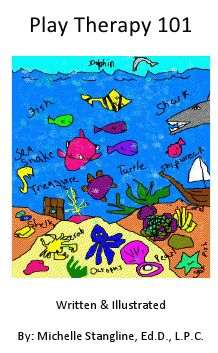
Small Group Counseling eBook For Sale:
Learn how to do creative group therapy and enhance your skills.
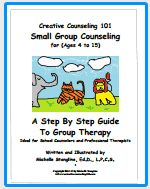
School Counselor Guidance Lesson & Social Stories eBook for sale:
Get a year's worth of school counselor guidance lessons with "Creative Warm & Fuzzy Classroom Guidance Lessons eBook". Introduce your students to the "Warm & Fuzzy Way". Click the link below for more information:
Warm & Fuzzy School Counselor Guidance Lessons eBook
